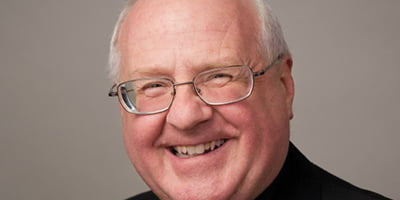
Father Mark Goldasich is the pastor of Sacred Heart parish in Tonganoxie. he has been editor of the Leaven since 1989.
by Father Mark Goldasich
For the life of me, I don’t know why I even bother. It’s the same story, year after year. I begin with high expectations, only to have them dashed time and time again.
You know what I’m talking about. Yep, that’s right: It’s bingo!
For the past 10 years, on the second Saturday in January, after the evening Mass, Sacred Heart Parish in Tonganoxie converts its multipurpose room into a bingo hall. Surprisingly, no matter what the weather is like, people can’t seem to stay away.
The game that we are familiar with today traces its roots to a December 1929 country carnival outside of Jacksonville, Ga. A New York toy salesman by the name of Edwin Lowe was heading toward Atlanta when he stumbled across this carnival, which was closed up . . . except for one tent. People were packed inside, around a horseshoe shaped table filled with numbered cards and beans.
A man was pulling small, numbered wooden disks from an old cigar box and calling out a number. When people had it, they’d place a bean on that number on their card until someone filled a row. When that happened, the person would call out “Beano!” and win a Kewpie doll.
Lowe noticed that people were practically addicted to the game. When he got back to New York, he invited some friends over. And, as in Georgia, people went nuts over it. One woman, so excited as the last number that she needed was called, ended up yelling out, “Bingo!” instead of “Beano!” And the rest is history. Lowe began to mass produce the game, and his toy company took off.
Several months after bingo hit the big time, a priest from a struggling parish in Wilkes-Barre, Pa., heard about the game and saw it as a way to ease the church’s financial woes. He bought several sets of Lowe’s game (each came with 12 to 24 cards) but, on this larger scale, it produced too many winners each time and cut down on the funds raised. So Lowe went back to the drawing board and approached a retired mathematician, named Carl Leffler, to come up with many more non-repeating number groups. Leffler invented 6000 different cards . . . and lost his sanity in the bargain. (It’s rumored that he actually created 6,001 cards, the last one being a guaranteed non-winner; that’s the one I always pick out.)
This past Jan. 8, over 315 people made their way to Sacred Heart for bingo. Food was available for purchase, but the main course was bingo. As it’s played at the parish — and maybe this is one of the reasons it’s so popular — each game has more than one winner, often up to eight. Winners receive a brown paper bag, or sometimes a black garbage bag, with a surprise prize inside (worth at least $5). I don’t know this from personal experience; I’ve only seen the bags delivered to others around me.
I never knew that there could be so many variations of the game: four corners, vertical only, blackout, and letter shapes (like an “X” or a “T”). We even have a special one at Sacred Heart, called “horizonial.” It was supposed to read “horizontal” but, years ago, a typo appeared on the sheet listing the order of games, and so we’ve kept it that way ever since.
Most humiliating — to me — is “loser bingo.” During the evening, a couple
of games are played only by those who haven’t won anything. We “losers” stand and remain standing . . . as long as the caller doesn’t say a number that’s on your bingo card. If you’ve got the num- ber called, you sit down . . . and become an even bigger loser. This year, though, I actually lasted through one or two numbers before I had to sit down!
So, why do I put myself through this torture each January? Well, for one thing, this bingo night is a fundraiser to help send kids from the parish to sum- mer camp at Prairie Star Ranch and to pay for various youth activities.
I also attend because:
• My mom, relatives, and assorted friends usually come to play and would disown me if I didn’t show up.
• It’s my “duty” to test out the chili, hot dogs, nachos, baked potatoes, popcorn, candy, etc., that they serve throughout the night.
• I provide the comic relief for attend- ees and lift their self-esteem. No matter how bad their luck might have been, they leave knowing that “they’re not as big a loser as Father Mark.”
A couple of years ago, a visiting mis- sionary, Sister Margaret Anne Meyer
of the Medical Missionaries of Mary, happened to be at the parish on a similar bingo night. Her words capture well
the evening’s spirit: “To see the church transformed into a lovely banquet hall and place of recreation for all ages, especially the young and old and young married couples, was a true experience of Eucharist for me.”
I have just one thing to say about Sister’s observations: Bingo!

